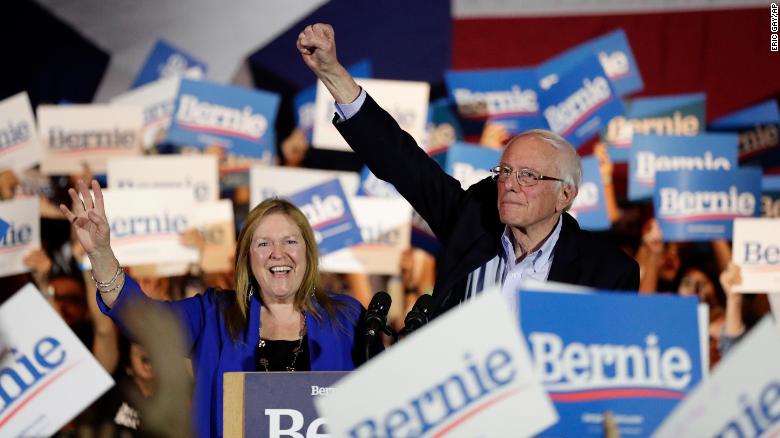
Las Vegas – For Pete Buttigieg, it’s now all about Bernie Sanders.
The former South Bend, Indiana, mayor used his final speech in Nevada on Saturday to first congratulate the Vermont senator on winning the state’s caucuses before lambasting the message animating Sanders’ campaign, attacking his movement as a “inflexible, ideological revolution” and arguing the “tenor” of his operation is one of “combat, division, and polarization.”
The focus on Sanders reflects an urgency from the Buttigieg campaign now that the Vermont senator has turned in a series of strong showings in Iowa, New Hampshire and Nevada and — in the eyes of his top campaign aides — could have a “seemingly insurmountable delegate lead” after March 3, when the delegate rich Super Tuesday states will vote.
“I believe the best way to defeat Donald Trump and deliver for the American people is to broaden and galvanize the majority that supports us on the critical issues,” Buttigieg said at his caucus day watch party. “Sen. Sanders believes in an inflexible ideological revolution that leaves out most Democrats, not to mention most Americans.”
Buttigieg then — in a line-by-line fashion — contrast his beliefs with Sanders, slamming the race’s frontrunner as someone who believes in “taking away” people’s health care choices and wants to “go beyond reform and reorder the economy in ways most Democrats — let alone most Americans” don’t want to do.
Buttigieg also questioned Sanders’ impact on down ballot races, stating that party needs someone who “actually gives a damn about the effect you’re having from the top of the ticket on those critical frontline House and Senate races that we need to win” and arguing his vision is “different from Sen. Sanders’ willingness to ignore or dismiss, or even attack the very Democrats that we absolutely must send to Capitol Hill.”
“That is the choice before us,” Buttigieg said. “We can prioritize either ideological purity or inclusive victory. We can either call people names online or we can call them into our movement. We can either tighten a narrow and hardcore base or open the tent to a new and broad and big-hearted American coalition.”
The mayor boasted of his own electoral success during his remarks.
“Ours is the only campaign that has beaten Sen. Sanders anywhere in the country,” Buttigieg said, citing the Iowa caucuses, where the state party announced that he won two more national delegates that the Vermont senator despite a razor thin margin.
The Nevada speech is by far the most direct Buttigieg has ever delivered about Sanders, a candidate who just months ago the former mayor went to lengths to avoid attacking by name.
But Buttigieg’s campaign, as Sanders’ momentum has grown, has become more aggressive than anyone in the Democratic field at taking on the race’s frontrunner.
The strategy is an acknowledgment that, without a significant change in the nomination fight, Sanders will be far ahead on the path towards winning the nomination — a point Buttigieg made publicly at the debate on Wednesday.
“We’ve got to wake up as a party,” Buttigieg said. “We could wake up two weeks from today, the day after Super Tuesday, and the only candidates left standing will be Bernie Sanders and Mike Bloomberg, the two most polarizing figures on this stage.”
Later in the debate, Buttigieg took on the fact that Sanders identifies as an independent — not a Democrat — by saying, “Let’s put forward somebody who’s actually a Democrat.”
Buttigieg’s campaign invested heavily in Iowa and New Hampshire, banking on momentum out of those two states propelling him to top tier status in Nevada, South Carolina and beyond.
That strategy has not played out exactly how Buttigieg would have wanted, though.
A surprising third place finish by Klobuchar in New Hampshire was viewed as an impediment to Buttigieg’s momentum out of the state. And Bloomberg, with his more than $400 million spent on television ads, has further crowded the group of moderate candidates running to take on Sanders, giving voters that may be pre-disposed to backing Buttigieg yet another option.
The mayor now heads into South Carolina, arguably his most trying earlier states due to his struggles winning over African American voters, and the slate of Super Tuesday states, where he has yet to spend any money on television ads.
Buttigieg, though, in a sign of his evolving strategy, began airing a new television ad in South Carolina on Friday night that attacks Sen. Bernie Sanders by name over his “Medicare for All” health care plan.
Buttigieg, asked if he failed to take Sanders seriously soon enough, said earlier on Saturday that he takes “everybody seriously.”
“But right now,” he said, “I think the race is really coming into focus. That is why these contrasts are very important for folks to think through and understand.”
As reported by CNN
